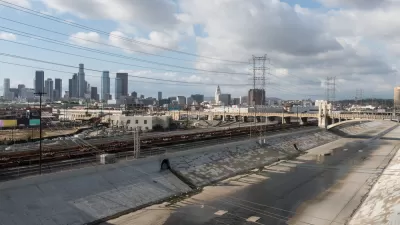With the dissolution of California Redevelopment Agencies in 2011, those looking to spur economic development have struggled to find alternative tools that create investment in communities where such investments don't flow naturally.
Senate Bill 628, passed in the fall, created Enhanced Infrastructure Financing Districts—intended to fill the "hole" that dissolution left. Since EIFDs are still brand new, none have yet been implemented, although many local governments have taken initial steps.
To unpack the law's complexities, its applications, and its potential impact on revitalization efforts across the state, The Planning Report spoke with two experts on the legislation: Fred Silva, Senior Fiscal Policy Advisor at California Forward, and Mark Pisano, USC Price professor and former Southern California Association of Governments executive director. They delve into the specific mechanisms of EIFDs, explaining the tool’s scope, structure, and powers.
Silva clarifies that EIFDs actually improve upon the old model, in his view: "After the repeal of redevelopment, the tool of capturing growth in the property tax was basically eliminated. The choice facing the Economic Summit was: 'Should we just put that Redevelopment Authority back, and not allow it to have access to the schools’ property tax?' The answer was 'no'—it should have broader authority."
FULL STORY: A New Tool for Urban Economic Development: EIFDs Demystified

Maui's Vacation Rental Debate Turns Ugly
Verbal attacks, misinformation campaigns and fistfights plague a high-stakes debate to convert thousands of vacation rentals into long-term housing.

Planetizen Federal Action Tracker
A weekly monitor of how Trump’s orders and actions are impacting planners and planning in America.

In Urban Planning, AI Prompting Could be the New Design Thinking
Creativity has long been key to great urban design. What if we see AI as our new creative partner?

Massachusetts Budget Helps Close MBTA Budget Gap
The budget signed by Gov. Maura Healey includes $470 million in MBTA funding for the next fiscal year.

Milwaukee Launches Vision Zero Plan
Seven years after the city signed its Complete Streets Policy, the city is doubling down on its efforts to eliminate traffic deaths.

Portland Raises Parking Fees to Pay for Street Maintenance
The city is struggling to bridge a massive budget gap at the Bureau of Transportation, which largely depleted its reserves during the Civd-19 pandemic.
Urban Design for Planners 1: Software Tools
This six-course series explores essential urban design concepts using open source software and equips planners with the tools they need to participate fully in the urban design process.
Planning for Universal Design
Learn the tools for implementing Universal Design in planning regulations.
Gallatin County Department of Planning & Community Development
Heyer Gruel & Associates PA
JM Goldson LLC
City of Camden Redevelopment Agency
City of Astoria
Transportation Research & Education Center (TREC) at Portland State University
Jefferson Parish Government
Camden Redevelopment Agency
City of Claremont



























